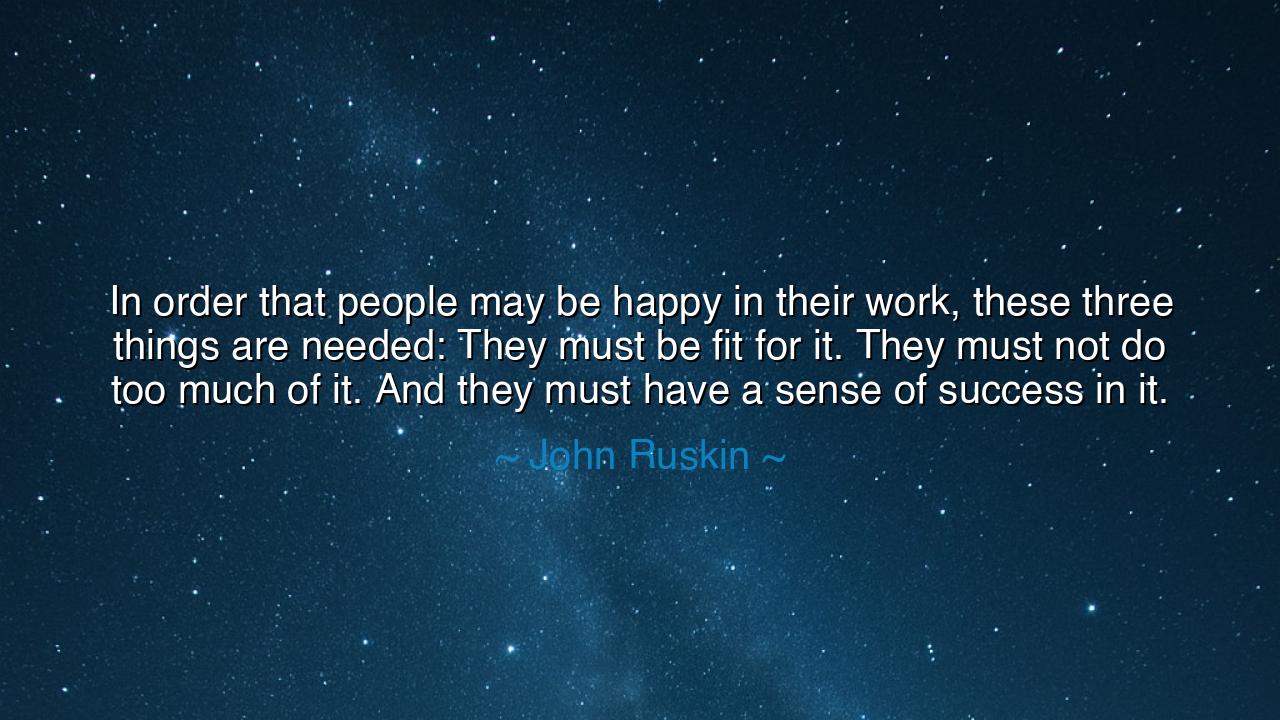
In order that people may be happy in their work, these three
In order that people may be happy in their work, these three things are needed: They must be fit for it. They must not do too much of it. And they must have a sense of success in it.






When the philosopher and social critic John Ruskin proclaimed, “In order that people may be happy in their work, these three things are needed: They must be fit for it. They must not do too much of it. And they must have a sense of success in it,” he gave to mankind a compass for labor, a teaching as relevant in his age of industry as in ours. For Ruskin looked upon the grim factories of Victorian England, where men, women, and children toiled endlessly, stripped of joy, and he dared to ask: what is the true purpose of work? His words remind us that work is not only to sustain life, but to enrich it—yet only when it honors the dignity of the worker.
The first truth Ruskin offers is that one must be fit for the work. To labor in a task that does not suit the body or soul is to suffer twice: in the burden itself, and in the inner weariness of misalignment. The ancients knew this well. Plato taught that each person has a nature, and harmony arises when one’s role matches that nature. The farmer thrives in the field, the philosopher in the academy, the craftsman at the forge. But when men are forced into work for which they are unfit, misery festers, and their spirit decays. True happiness in labor begins when the worker and the work are rightly matched.
The second truth is that one must not do too much of it. For though labor is noble, excess is tyranny. Even the strongest ox falters when it is never unyoked, and even the most skilled artisan grows resentful when his hands are never allowed to rest. The Scriptures themselves declare a Sabbath, a day of rest, teaching that both man and beast must breathe, lest the flame of life be extinguished by endless toil. Ruskin reminds us that to work without pause is to turn joy into drudgery, and to shorten not only the span of days, but the quality of them.
The third truth is the need for a sense of success. Without this, labor is like pouring water into a broken vessel, effort without reward, motion without meaning. The soldier endures hardship because he sees the banner rise; the weaver continues because she beholds the beauty of her cloth. To work without seeing fruit is to despair, but to behold even a small success is to feel renewed, to know that one’s effort matters. Thus, Ruskin points us to the heart of human dignity: the need to see value in one’s own creation.
History gives us many witnesses to this wisdom. Think of Florence Nightingale, who during the Crimean War transformed the work of nursing. She was fit for it, with her compassion and discipline; she did not exhaust herself into collapse but trained others to share the burden; and she saw the success of her work in the declining death rates of the soldiers. Her joy was not in wealth or recognition, but in knowing that her work bore fruit, that it mattered. In her life, Ruskin’s teaching finds flesh and blood.
The meaning of Ruskin’s words is thus not only about work, but about life itself. To live well, one must align one’s nature with one’s tasks, preserve balance with rest, and seek meaning in the fruits of effort. Work without fitness breaks the spirit, work without rest breaks the body, work without success breaks the heart. But when all three are present, labor becomes not a curse, but a blessing, a daily act of joy, a hymn to life.
The lesson for us is clear. Seek the work that fits you, not only in skill but in soul. Guard yourself against the poison of endless busyness, for even noble labor becomes slavery when it consumes all. And cherish the small victories, for they are proof that your effort is not in vain. If you are a leader, honor these truths in those you guide: place them in fitting roles, give them space to rest, and let them see the worth of their work. In doing so, you honor not only productivity, but humanity itself.
Therefore, let us hold Ruskin’s words as law for all generations: to be happy in work, one must be fit for it, do not too much of it, and see success in it. These are not luxuries, but necessities, woven into the very fabric of human dignity. When these three are honored, work becomes not merely survival, but joy; not merely burden, but purpose. And in this harmony of labor and spirit, life itself finds its true song.






AAdministratorAdministrator
Welcome, honored guests. Please leave a comment, we will respond soon